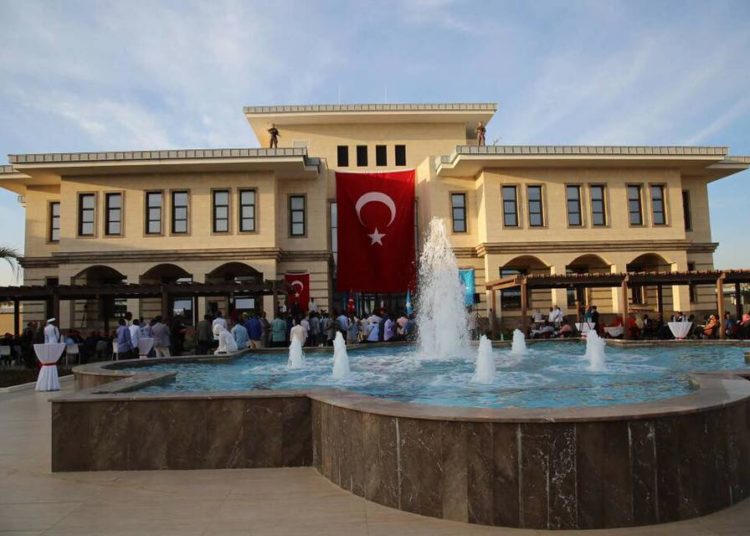Nordic Monitor
The Turkish Embassy in Mogadishu has confirmed that the Albayrak Group, a Turkish conglomerate accused of corrupt practices in Turkey and abroad with the help of the Turkish president, is conducting its projects in Somalia “under the auspices of the Embassy.”
Via its official Twitter account the embassy unintentionally revealed how an important actor in President Recep Tayyip Erdoğan’s corrupt business system has become a key figure in Somalia, which is ranked as one of the most corrupt countries in the world in reports from Transparency International and the UN Office on Drugs and Crime (UNODC).
The embassy message is one of many indications that show how the Turkish Foreign Ministry and its diplomats have been transformed into conveyor belts for extending Erdoğan’s crony system abroad.
The Albayrak Group is owned by the Albayrak family, which is known to have close ties to Erdoğan’s ruling Justice and Development Party (AKP). The group publishes the Yeni Safak daily, an Islamist rag sheet that is a mouthpiece for the Erdoğan regime. It also owns two national TV networks as well as Kanal 7 and Ülke TV. One of the Albayrak family members attended the İstanbul İmam-Hatip, a religious public school, together with Erdoğan in the 1970s.

In Somalia the Albayrak Group has constructed housing units financed by Turkish agencies since 2011. Moreover, it took over the port of Mogadishu in 2014 and has operated the port in line with Erdoğan’s agenda. Since then, corruption and bribery have become more widespread, and the port has functioned as the main gate of the corrupt system.
According to the Somalia Corruption Report from GAN Integrity, bribery is common when clearing goods through the Mogadishu port, operated by the Albayrak Group. Furthermore, trade in counterfeit goods is widespread at Somalia’s borders and has also served as a source of financing for armed rebels such as al-Shabab.
The head of the Mogadishu Port Tax Authority, Ahmed Ali Samow, and nine other top officials were arrested for allegedly diverting duties collected from the busy seaport in 2018. The port arrests have attracted considerable public attention since port is the highest revenue earner for the federal government of Somalia and is believed to be a hotbed of graft with duties ending up in private pockets.
The latest presidential election in Somalia in February 2017 has been labelled by the UN and analysts as a “milestone” and “landmark in corruption.” Rival presidential candidates accused each other of bribing MPs and senators in exchange for their support. In addition to some Gulf states, Turkey is suspected by some to have funded the election campaign of a certain candidate in exchange for favorable business deals or other geopolitical interests, thereby indirectly fueling corruption.
On July 8, 2019 Turkey signed a grant agreement with Somalia, promising to give $2.5 million in cash every month for a total of $30 million. Ankara has provided similar funds to the Somali government in that past that were the subject of corruption allegations.
Nordic Monitor previously reported that Turkey’s National Intelligence Organization (MİT), led by a pro-Iranian Islamist figure, delivered hundreds of thousands of dollars to the al-Shabab terrorist organization in Somalia through a former Gitmo detainee. The transfer of the funds was picked up by the US government, which alerted Turkish authorities and asked for an investigation into the network that enabled the funding of al-Shabab. Yet the Islamist government of President Erdoğan hushed up the probe that was launched after the notification from the office of the US Treasury’s Under Secretary for Terrorism and Financial Intelligence, which was led by David S. Cohen at the time.

In Turkey, Albayrak companies have won many large public tenders ranging from construction of the Istanbul metro to producing tanks for the Turkish army, many of which were the subjects of controversy and investigations of corruption.
The Albayrak media group has been the most loyal supporter of Erdoğan’s radical Islamist policies since his party came to power in November 2002 and has become an important column in his new media structure. In return, both the Albayrak Group and its media conglomerate have benefited immensely from Erdoğan’s political success in subsequent years.
According to a Reporters Without Borders (RSF) report on Turkey, the phone conversations of Ahmet Albayrak, head of the group, were wiretapped in 2009 as part of an ongoing investigation, in which Albayrak can be heard making plans to change the members of the state-run Press Advertising Agency (Basın İlan Kurumu) in order to secure more advertising revenue for Yeni Şafak and making arrangements to support the AKP in local elections in Trabzon.

Following the collapse of the Siad Barre regime in 1991, the Somali state largely ceased to exist and had no governing authority. Famine and fighting killed approximately 300,000 people in 1991 and 1992, prompting a UN humanitarian mission led by US forces. The intervention soon deteriorated into urban guerrilla warfare with Somali militias. In September 2012 Somalia established a new government and drafted a provisional constitution in an attempt to usher in the country’s first permanent government in more than 20 years.
Erdoğan has shown a great interest in Somalia since 2011 and ordered the construction of Turkey’s largest embassy compound in Mogadishu while also building a military training center and military school. His associates secured the operating rights of both the airport and seaport facilities. He appointed Cemalettin Kani Torun, a staunchly Islamist doctor, as a non-career ambassador to Mogadishu in 2011. Acording to Turkish government insider Fuat Avni, Torun funneled millions of dollars to Erdoğan’s business associates while he was there, until 2014. He also secretly met with al-Shabab terrorist leaders and sold them arms. Torun was rewarded for his services by Erdoğan, who appointed him chief advisor in 2014 and made him a deputy in parliament a year later.












